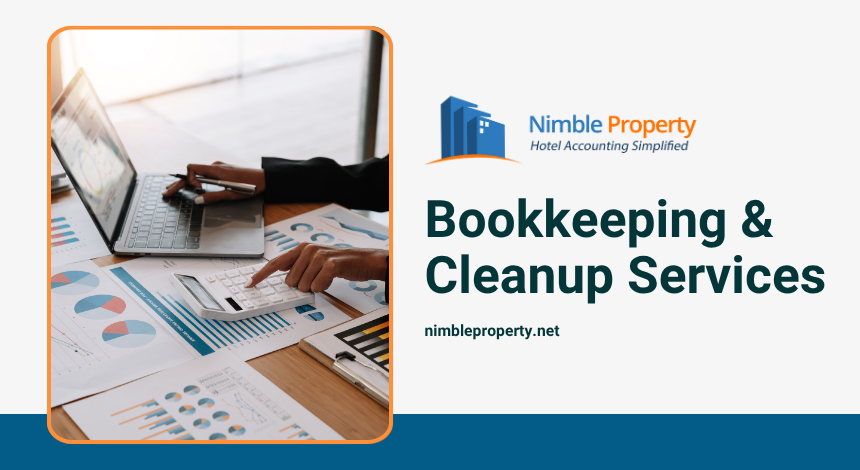Transparent accounting system is quite essential for any business in the competitive business landscape. It ensures that you are going in the right way. Organized and accurate bookkeeping gives the healthy outlook to investors and bankers, who prefer giving loan to businesses that maintain global standards. Literally that accepts the Generally Accepted Accounting Principles (GAAP). Here is the ultimate guide to hotel owners and a wide range of hotel businesses, to make the unstructured accounting into a simplified one. Nimble Property is an industry specific software designed to suit the needs of the hospitality industry.
The hotel accounting software and Bookkeeping Cleanup services offered by the Nimble Property ensures that you remain compliant with the accounting standards set by the respective Government agencies.
The major steps involved in the Bookkeeping Services, when Nimble takes the responsibility of handling accounts of their clients comprise:
1 .Building Up Financial Documents:
First, gather all your financial records, such as:
Bank statements: for credit card, savings, and checking accounts.
Receipts: Hard copy and electronic records of business expenditures.
Invoices: Issued to clients as well as received from vendors.
Additional financial data include payroll information, tax returns, and loan statements.
Utilize mobile scanning applications to digitize invoices and receipts for convenient categorization and storage to streamline this procedure.
2. Bank Statement Reconciliation:
Look for differences between the amounts on your bank statements and your accounting records. Typical offenders include:
- Unpaid checks that have been written but not yet cashed.
- Deposits in transit are those that are made but do not appear on statements.
- Bank errors include improper transactions or unapproved expenditures.
Resolving these disparities guarantees precise financial monitoring.
3. Split Transactions into Groups
Tracking spending trends and spotting savings opportunities are made easier with proper classification. Typical categories consist of: –
- Wages & Salaries
- Marketing & Promotion – Materials & Stock
- Business and Travel Costs
- Rent and utilities
To preserve financial clarity, make sure that the categories are consistent.
4. Review Outstanding Invoices and Bills
Check for unpaid vendor invoices and uncollected client payments. Properly record:
– Accounts Payable: Amounts owed to vendors.
– Accounts Receivable: Payments due from clients.
Regular follow-ups on overdue payments can improve cash flow.
5. Manage Accounts Payable & Receivable
Organizing these accounts ensures timely vendor payments and efficient debt collection.
– Accounts Payable: Avoid late fees and maintain good vendor relations.
– Accounts Receivable: Follow up on unpaid invoices to maximize cash flow.
6. Review and Update Fixed Assets
Fixed assets like equipment, furniture, and vehicles should be reviewed for depreciation and tax reporting. Properly recording asset values ensures accurate financial reporting.
7. Reconcile Credit Card Statements
Ensure all credit card transactions align with your records. Be mindful of:
– Mixing Personal & Business Expenses: Keep business transactions separate.
– Matching Receipts to Statements: Verify each charge for accuracy.
8. Review and Categorize Payroll Records
Payroll accuracy is crucial for tax compliance. Key data includes:
– Employee Salaries & Wages
– Payroll Taxes: Federal, state, Social Security, and Medicare.
Accurate payroll records ensure timely payments and prevent compliance issues.
9. Review and Categorize Inventory Records
For businesses managing physical products, tracking inventory is essential. Maintain records of:
– Cost Per Item: The amount paid for each unit.
– Stock Levels: Current inventory on hand.
Accurate inventory management prevents losses and optimizes purchasing decisions.
10. Ensure Tax Compliance
A well-maintained bookkeeping system simplifies tax preparation. Key areas to review:
– Accurate Transaction Categorization
– Eliminating Negative Balances
– Ensuring Balance Sheet Accuracy
Cross-check loan balances with year-end statements for precision in tax calculations.
11. Backup Your Data
Safeguard your financial records from data loss due to system failures or cyberattacks by regularly backing up data using:
– External Hard Drives
– Automated Backup Systems
Regular backups prevent catastrophic financial losses.
12. Schedule Routine Bookkeeping Sessions
Ongoing maintenance prevents future cleanup headaches. Regularly:
– Categorize Transactions
– Reconcile Accounts
If bookkeeping feels overwhelming, consider hiring a professional to maintain accurate records and offer financial insights.
Final Thoughts
A well-organized bookkeeping system ensures financial clarity, making it easier to manage cash flow, meet tax obligations, and make informed business decisions. Nimble Property serving over 2000 clientele across the United States, is renowned for offering the best financial products to the hospitality industry. Its services are highly acclaimed in the hospitality industry. Bookkeeping Cleanup Services takes you out of the immediate problems associated with unorganized accounting practices.
Book a Free Demo today

